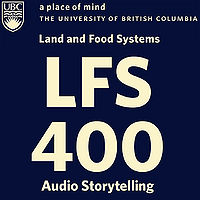Course:LFS400
Appearance
| Audio Storytelling | |
|---|---|
 | |
| LFS 400 | |
| Section: | 001 |
| Instructor: | Juli Carrillo, MCML 333 |
| Duncan McHugh, MCML 264B | |
| Email: | juli.carrillo@ubc.ca |
| Office: | |
| Office Hours: | |
| Class Schedule: | |
| Classroom: | |
| Important Course Pages | |
| Syllabus | |
| Lecture Notes | |
| Assignments | |
| Course Discussion | |
This course teaches you to use audio technology and a journalistic framework in order to tell powerful stories and present academic content in new ways. It is a seminar course with a lot of personal attention, critical feedback and weekly lab-based work. By the end of the term, students will have the ability to share their knowledge in effective and creative ways.
Learning Outcomes
Upon successful completion of this course, the students will be able to:
- Synthesize information to form an original personal narrative or a story;
- Apply technological tools to convey their content in podcast format;
- Develop media literacy for critical engagement with disciplinary knowledge.
During this course, students will learn to:
- Apply critical and creative thinking skills in the collection and analysis of information;
- Compare different channels and purposes of journalistic communication (e.g., traditional media outlets, social networks);
- Integrate discipline specific knowledge in powerful messages through 'humanizing the content';
- Understand the basic mechanics of creating a message for a purpose (e.g., story for emotional engagement, dissemination, awareness building, advocacy, news etc.);
- Develop skills to effectively critique their own and peers' work;
- Give and receive meaningful feedback
Course Requirements
Active participation in the class and completion of all assignments by the deadlines indicated in the course schedule is required.
Assignment Descriptions
Grading
| Assignment | Weight |
|---|---|
| Streeter (1 min) | 10% |
| Voicer (1:30 mins) | 10% |
| Project Outline | 10% |
| Group piece | 10% |
| Draft podcast | 10% |
| Final podcast | 25% |
| Post-podcast Reflection | 15% |
| Participation | 10% |
Course Schedule
Topics and Intellectual Territory Flow
- Course introduction
- General Journalism and Storytelling
- Interview Skills
- Journalist, Citizen journalist, or Advocate? It all depends on your purpose
- Podcast Story Construction and Paper edit Plan/Story Boarding
- Technology 'platforms' and Communication/Traditional Media Outlets vs. Social
- Networks: Implications, Advantages and Disadvantages; Using Data
- Visualization Tools to Support your Message
- Media Relations and Message Positioning
Podcast Grading Rubric
See Course:LFS400/Podcast_Grading_Rubric